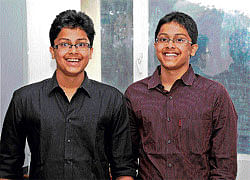Making learning easy for those with disabilities

But then, the 17-year-old twins have been doing awesome things themselves during their summer break from school. They have developed the prototype of a software that could revolutionise the way children with a range of specific learning difficulties — from cerebral palsy to autism — learn rudimentary Math, English, and social skills.
The prototype is all set to roll out on an open-source platform, with support from a tech firm in the City. The boys fervently hope it will inspire programmers, material developers and just anyone with a caring heart to add, improve and take this unique project forward.
Cost-effective
“It’s sad if a child in India has to learn vocabulary or numerical concepts that are designed for a child in the Western world only because precious little is available here. The cost of the available software is very high and unaffordable to many,” says Varun.
“Assistive software that is available today is not within the Indian context like language, currency, pictures depicting people or daily scenes,” explains Tejas.
These truths dawned on the boys when they volunteered at the Bangalore chapter of the Spastics Society of Karnataka (SSK).
Volunteering is something they’ve been doing since they were in middle school. In Maryland in the US where they lived until 2005, they worked at a shelter. When they moved to Bangalore they volunteered at Parikrama, where they taught the kids karate.
At Manonandana in Basavanagudi, they helped the kids with Math and Science. This year, they moved house. One of their neighbours, who works at the Spastics Society of Karnataka, invited them over to her office. And her work in the area of Assistive Technology had the boys hooked. Their first engineering feat was a small but practical spoon-holder. “It can be strapped on to the hand with a pivot on the elbow that allows a child to eat on his own,” explains Tejas.
Next they turned their attention to the wheelchair. “Wheelchair-bound kids, especially those with only one arm, need someone to steer them. It would be nice if they could work the wheelchair independently. We attached an old walking stick to a lever, turned this into a handle which allowed the child to propel the wheelchair without help,” says Varun.
Meeting Mrutyunjay
Soon Varun ‘anna’ and Tejas ‘anna’ had kids trailing them on campus. “Do you go to school? What do you study? What will you be when you grow up?” Mrutyunjay, one of the kids at SSK, asked Varun. “When I said I wanted to be an engineer, Mrutyunjay nodded happily and said, ‘Me too!’
Here is a boy who struggles with simple arithmetic, but just look at his spirit. He believes that he can conquer the world. It’s his optimism that triggered our project,” says Varun.
The boys began assisting SSK in developing a learning tool that could help children like Mrutyunjay read and carry out simple, daily transactions. But they discovered that children with different disabilities have very different requirements. Initially, they took an existing software, Indianised the content and implemented it for the children.
“We built a prototype and during testing we realised that any solution only addresses a very small number of kids. Flexibility had to be built into the system so as to benefit a larger number of children,” says Tejas.
Open Source
“Any assistive software has to be flexible enough that many children will be able to use it. It must be changeable on many different variables,” says Rabindra Issac, Associate Director, DRC-CBR, SSK.
Aware that economies of scale kick in when more users can start utilising the tools, Varun and Tejas took help from Span Systems.
“Separating programme from content allows localisation of material. It allows individuals other than software developers to contribute. It allows a separate path of development for each without delay due to interdependencies,” says Naganand Doraswamy, Founder-Director, Span Systems.
The boys have now decided to take the open-source route, where programmers and material developers from around the world can contribute.
Varun and Tejas are back in school. But Mrutyunjay is never far from their thoughts. In a few weeks, their summer project could make a big difference to countless little Mrutyunjays, across India and the world. All they need is concrete support from a few more caring hearts.